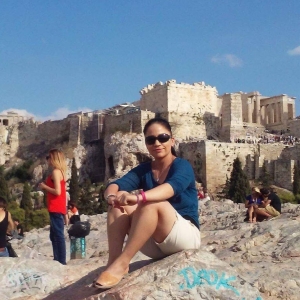Celebrating Women’s History Month with MSW Student and Military Veteran Adriana Guerrero
March 07, 2019- Students
In honor of Women’s History Month, meet MSW student and Marine Corps veteran Adriana Guerrero, who is committed to serving victims of sexual assault and violence both inside and outside of the military.
March is Women’s History Month, established to recognize the invaluable contributions that women have made to our country throughout history. To celebrate, we’re highlighting the accomplishments of a notable MSW student at the USC Suzanne Dworak-Peck School of Social Work: Adriana Guerrero, decorated Marine Corps veteran and advocate for sexual assault victims.
USC Suzanne Dworak-Peck School of Social Work: Can you describe your experience in the Marines, and how your unique role as a uniformed victim advocate shaped your interest in working with survivors of sexual assault?
Adriana Guerrero: During my 13 years in the Marine Corps, I served as a recruiter for officers and enlisted personnel and eventually a uniformed victim advocate (UVA). In my role as an advocate, I was on call 24 hours a day to respond to the needs of victims of sexual assault—from providing emotional support to offering medical, spiritual, and legal options to the 300 Marines in my unit.
I had always known that I wanted to help those in need, but had never found the right avenue until I had the opportunity to work with victims of sexual violence. It was heartbreaking to realize that violence against women—especially in the military—is rendered culturally normative. People are often willing to turn a blind eye or frame the violence as simply an unfortunate part of military life. Since serving as a uniformed victim advocate, I have wanted to change those norms and serve victims who may not have the resources or ability to advocate for themselves.
USC: What led you to pursue your MSW at USC?
AG: While enlisted, I became a first-generation college student, earning my bachelor’s degree from City University of Seattle and an MBA from Benedictine University. I valued my education but wasn’t sure what I wanted to do with my degrees or how to harness my passion for helping others to build a career after the military.
After leaving the military, I took a job at a Solana Beach-based nonprofit, where I provided services for the preschool, senior center, and immigration/legal aid programs. Through the organization, I met a licensed clinical social worker who recognized my passion for helping others, and specifically advocating for women and victims of sexual assault.
He became a mentor for me and suggested that I consider social work. I decided to take his advice. When I came across the program at the USC Suzanne Dworak-Peck School of Social Work, the world-class faculty and the scope and rigor of the program’s curriculum stood out to me. I dropped everything and moved to LA after I was accepted.
USC: What have been some of the most valuable experiences of your social work education at USC?
AG: The field placements I’ve completed have been formative. Last year, I did a clinical internship at Aviva Family and Children’s Services, where I served as a therapist for adult survivors of sexual assault and intimate partner violence.
This year, I was placed with the Housing Authority of the City of Los Angeles (HACLA), where my work is focused on policymaking and involves coordinating a number of unique services associated with public housing. It’s been extremely valuable to have experiences on both the clinical micro-level and the policy-focused macro-level.
USC: Outside of your coursework and field placements, how have you participated in the USC social work community?
AG: I’ve tried to make the most of my time at USC and push myself out of my comfort zone. That has involved volunteering, participating in social justice initiatives, and becoming a student board member of the National Association of Social Workers (NASW) USC Unit.
Last year, I was a member of the executive board of the Clinical Social Work Caucus and this year, I’m the vice president of the Student Organization at the USC Suzanne Dworak-Peck School of Social Work. As a representative for USC social work students, I monitor the progress of all standing interest groups, serve as a liaison between students and deans, and coordinate a number of student volunteer efforts. Through these roles, I have had the opportunity to work with a number of different caucuses across the school and have become more actively involved in the USC Military Academic Center.
USC: What do you envision yourself doing after you graduate?
AG: I’d be interested in working with the military population again. Since the military is dominated by men—especially the Marine Corps, which is the smallest branch of the armed forces—women’s voices are often undervalued or not heard at all. I would like to see systemic change that empowers all victims to make their voices heard and encourages higher levels of reporting in the military. At the same time, I want to break down deeply rooted social stigmas that inhibit service members from expressing vulnerability or need, along with the social and cultural norms that continue perpetuating intergenerational violence against women.
Whether or not I go into military social work after I graduate this May, my priority is to act as an effective advocate for victims of sexual assault, human trafficking, and the various forms of intimate partner violence.
To reference the work of our faculty online, we ask that you directly quote their work where possible and attribute it to "FACULTY NAME, a professor in the USC Suzanne Dworak-Peck School of Social Work” (LINK: https://dworakpeck.usc.edu)
